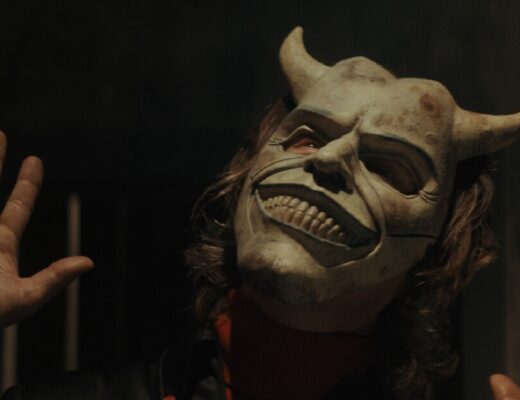The inspiration for Maggie Betts’ The Burial was an actual court case that took place in Mississippi in 1995, in which Jeremiah O’Keefe, the former mayor of Biloxi and the owner of a string of local funeral parlors, brought a $100 million lawsuit against Canadian conglomerate The Loewen Group over a failed business deal. Yet one could be forgiven for reasonably assuming the film was conceived about 30 seconds after the producers of Green Book accepted their Best Picture Oscar. On the face of it, the particulars of the trial don’t scream out for a cinematic adaptation: originating as a contractual dispute over an aborted effort by the Loewen Group to purchase three of O’Keefe’s funeral homes, the trial eventually expanded in scope to expose the corporation’s practices of price-gouging its impoverished (predominantly Black) customers. It’s your basic corporate malfeasance story with a bit of David and Goliath thrown in for good measure, but the case was no more notable than a thousand other civil trials except, perhaps, the staggering amount in punitive damages ultimately awarded to the plaintiff by the jury.
However — and this is the important bit — Jeremiah was a soft-spoken white man who, though not a racist himself, had no compunction about associating with bigots in his friendships and business dealings. Whereas his attorney, Willie Gary, was a brash, flashy, Black man; a personal injury lawyer known for showing up on Lifestyles of the Rich and Famous boasting about his private plane and 50-room mansion. Willie was also the sort of attorney who made a point of not taking on white clients. It doesn’t take much to envision the “inspirational comedy” of reaching across racial and cultural divides to find a common ground that might spring from this premise, particularly once you’ve cast Jamie Foxx as Willie and Tommy Lee Jones as Jeremiah. One’s loud, the other’s quiet! One’s style, the other’s substance! One’s a braggart, the other’s modest! And on it goes, with this unlikely duo fighting the good fight, taking on a scummy company that exploits the grief of the poor and the vulnerable, while simultaneously growing as men and even becoming good friends.
By the filmmakers’ own admission, the initial hook here was the sheer novelty of an elderly white southern man hiring a flamboyant Black attorney, as though that alone might tap into a deep pocket of comedic ore. Yet, whatever its connections to real life, the film’s shape is straight formula and hokum. It’s never quite as trite as the aforementioned Academy Award winner — i.e. no one is cured of racism over a lunch of fried chicken — but the film’s not exactly busting apart that particular mold either. Put it this way: if you’ve ever longed to watch the curmudgeonly Jones cut loose by singing Tony! Toni! Toné’s “Feels Good,” then your ship has come in.
The case itself hinged upon a fairly mundane procedural disagreement: Loewen’s CEO, Ray Loewen (great character actor Bill Camp), slow-walked closing on three funeral parlors he verbally agreed to purchase from Jeremiah, allowing the deal to languish for months without countersigning the contract. This put Jeremiah in dire financial straits, having only agreed to sell the funeral homes to offset some questionable investment that had put him on the brink of insolvency. Whether Loewen intended to wait Jeremiah out — forcing him into bankruptcy at which point he could simply pick off the rest of the business — or merely had more pressing concerns as the head of a billion-dollar company was unclear, but the delay was enough for Jeremiah to file suit in the backwater of Hinds County, Mississippi. Initially represented by Jeremiah’s longtime lawyer Mike Allred (Alan Ruck, recently of Succession), it became apparent that the attorney’s good ol’ boy schtick wouldn’t play with a jury pool likely to be 70% Black. So the legal team devised a theory so patronizing it could only justify it by placing it in the mouth of a person of color (Mamoudou Athie’s Hal, a young Black lawyer inexplicably joined at the hip with Jeremiah, a relationship that’s almost certainly pulling from real life yet never quite justifies itself in the film): they’ll bring on a Black lead counsel to dazzle a mostly-Black jury.
The hope is that dramatic liberties were involved because, as presented here, Hal stumbled onto Willie seemingly by watching television, becoming convinced he’s the only man for the job despite having zero experience with contract law. One would think there would be numerous, more than qualified Black attorneys with experience trying this sort of case, but why get too hung up on that? Willie initially turns the case down for all the obvious reasons, but his interest is piqued at learning just how deep Loewen’s pockets are — Jeremiah’s original suit was for just $6 million; once Willie gets involved, the number jumps by a multiplier of seventeen. Now leading the case, effectively cowing Mike into assuming a subordinate role, Willie is ready to go into battle to “kill a giant,” but there’s always a new wrinkle. Specifically, Loewen has brought on a team of Black defense attorneys, led by the fiercely competitive Mame Downes (Jurnee Smollett). While both sides attempt to turn the case into a referendum on race and character, dragging personal baggage from both the plaintiff and the defendant into court, Willie’s glib approach to law — particularly, his tendency to value high-risk/high-reward gambits over fundamentals and due diligence — begins to rankle the more cautious Jeremiah, threatening to cause a rift between the two men and derail the case.
Assessing the relative success of a film like The Burial can be tricky, as it’s designed to be a broad, crowd-pandering duel between the forces of good and evil; the latter feels especially pronounced once it becomes clear the extent The Loewen Group has exploited the grief and circumstances of the Black parishioners of a Baptist Church. It’s the sort of film which all but encourages call and response and audible tsk-tsking from its audience during the more inflammatory exchanges, and on those terms (based on firsthand evidence) the film “plays.” Prejudiced white characters squirm under the scrutiny of their shameful heritage or when confronted by people of color who have their number. Uncaring corporate slimeballs rage and throw chairs in response to being outmaneuvered. Men of different races and backgrounds realize they have more in common than they don’t. Foxx gives precisely the performance one might expect, orating and preening as a fast-talking, self-appointed master of the universe until his arrogance gradually gives way to humility. Jones, for his part, feels uncommonly reserved and drawn, even for an actor who’s turned being comically taciturn into a personal brand.
But is this really the best we can do? Is it too much to ask that a film not reach for the single most obvious comedic beats or dusty homilies about tolerance? Betts isn’t especially concerned with nuance or subverting expectations; everything here is a slow pitch straight down the middle of the plate. Sure, the film connects, but where’s the drama in it? The Burial is at its best (or at least its most surprising) when it briefly peels off to explore the systemic practice of erasing the histories of poor Black people, personified by an old slave burial plot marred by an absence of headstones. It lends a sense of gravity to the court proceedings, although, even then, it’s essentially a sidebar. If The Burial is guilty of anything, it’s of being roundly inoffensive and overly familiar, and more than a little pat in its life lessons. There are far more egregious examples in this genre, but there are also plenty of films that have navigated this subject matter with a greater sense of invention, pricklier racial politics, and more adventurous filmmaking choices. There’s no real harm in giving something like this a pass, but then, we’ve been here before. That’s how you end up with Oscar winner Peter Farrelly.
DIRECTOR: Maggie Betts; CAST: Tommy Lee Jones, Jamie Foxx, Jurnee Smollett, Mamoudou Athie; DISTRIBUTOR: Amazon Studios; IN THEATERS: October 6; STREAMING: October 13; RUNTIME: 2 hr. 6 min







